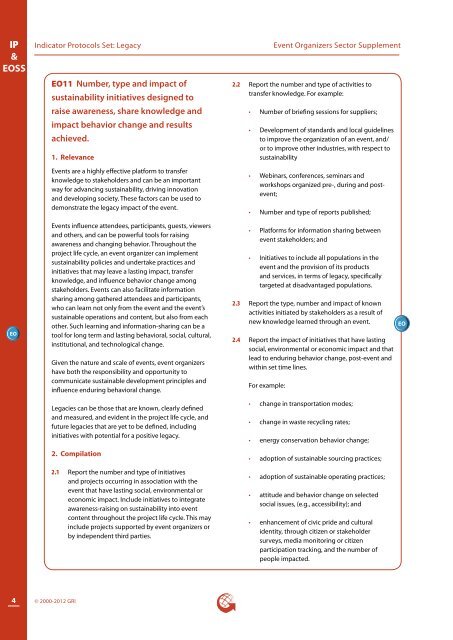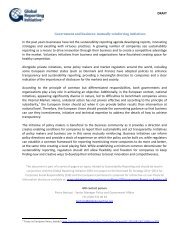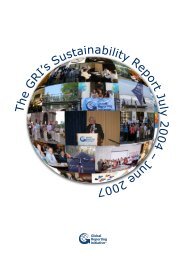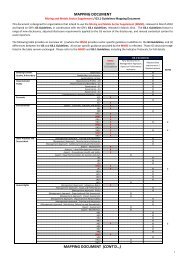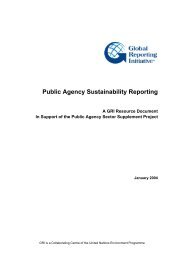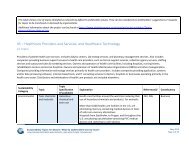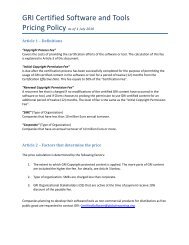Event Organizers Sector Supplement - Global Reporting Initiative
Event Organizers Sector Supplement - Global Reporting Initiative
Event Organizers Sector Supplement - Global Reporting Initiative
You also want an ePaper? Increase the reach of your titles
YUMPU automatically turns print PDFs into web optimized ePapers that Google loves.
IP<br />
&<br />
EOSS<br />
Indicator Protocols Set: Legacy<br />
EO11 Number, type and impact of<br />
sustainability initiatives designed to<br />
raise awareness, share knowledge and<br />
impact behavior change and results<br />
achieved.<br />
1. Relevance<br />
<strong>Event</strong>s are a highly effective platform to transfer<br />
knowledge to stakeholders and can be an important<br />
way for advancing sustainability, driving innovation<br />
and developing society. These factors can be used to<br />
demonstrate the legacy impact of the event.<br />
<strong>Event</strong> <strong>Organizers</strong> <strong>Sector</strong> <strong>Supplement</strong><br />
2.2 Report the number and type of activities to<br />
transfer knowledge. For example:<br />
• Number of briefing sessions for suppliers;<br />
• Development of standards and local guidelines<br />
to improve the organization of an event, and/<br />
or to improve other industries, with respect to<br />
sustainability<br />
• Webinars, conferences, seminars and<br />
workshops organized pre-, during and postevent;<br />
• Number and type of reports published;<br />
EO<br />
<strong>Event</strong>s influence attendees, participants, guests, viewers<br />
and others, and can be powerful tools for raising<br />
awareness and changing behavior. Throughout the<br />
project life cycle, an event organizer can implement<br />
sustainability policies and undertake practices and<br />
initiatives that may leave a lasting impact, transfer<br />
knowledge, and influence behavior change among<br />
stakeholders. <strong>Event</strong>s can also facilitate information<br />
sharing among gathered attendees and participants,<br />
who can learn not only from the event and the event’s<br />
sustainable operations and content, but also from each<br />
other. Such learning and information-sharing can be a<br />
tool for long term and lasting behavioral, social, cultural,<br />
institutional, and technological change.<br />
Given the nature and scale of events, event organizers<br />
have both the responsibility and opportunity to<br />
communicate sustainable development principles and<br />
influence enduring behavioral change.<br />
• Platforms for information sharing between<br />
event stakeholders; and<br />
• <strong>Initiative</strong>s to include all populations in the<br />
event and the provision of its products<br />
and services, in terms of legacy, specifically<br />
targeted at disadvantaged populations.<br />
2.3 Report the type, number and impact of known<br />
activities initiated by stakeholders as a result of<br />
new knowledge learned through an event.<br />
2.4 Report the impact of initiatives that have lasting<br />
social, environmental or economic impact and that<br />
lead to enduring behavior change, post-event and<br />
within set time lines.<br />
For example:<br />
EO<br />
Legacies can be those that are known, clearly defined<br />
and measured, and evident in the project life cycle, and<br />
future legacies that are yet to be defined, including<br />
initiatives with potential for a positive legacy.<br />
• change in transportation modes;<br />
• change in waste recycling rates;<br />
• energy conservation behavior change;<br />
2. Compilation<br />
• adoption of sustainable sourcing practices;<br />
2.1 Report the number and type of initiatives<br />
and projects occurring in association with the<br />
event that have lasting social, environmental or<br />
economic impact. Include initiatives to integrate<br />
awareness-raising on sustainability into event<br />
content throughout the project life cycle. This may<br />
include projects supported by event organizers or<br />
by independent third parties.<br />
• adoption of sustainable operating practices;<br />
• attitude and behavior change on selected<br />
social issues, (e.g., accessibility); and<br />
• enhancement of civic pride and cultural<br />
identity, through citizen or stakeholder<br />
surveys, media monitoring or citizen<br />
participation tracking, and the number of<br />
people impacted.<br />
4<br />
© 2000-2012 GRI


